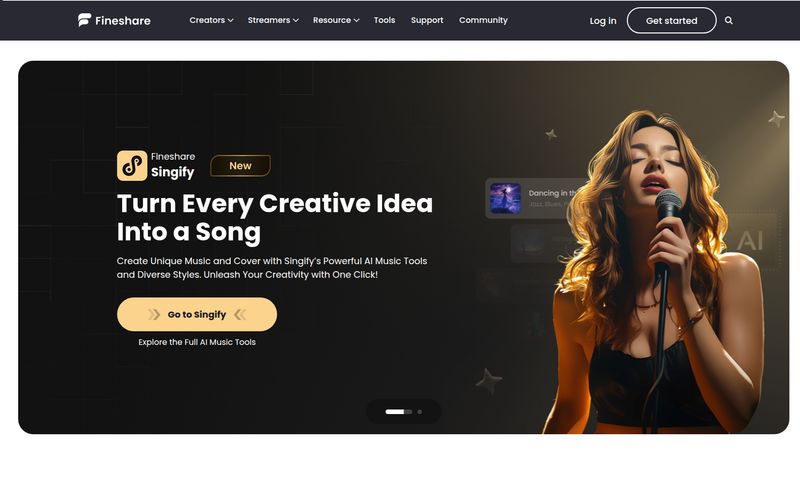I’ve been in the SEO and digital marketing game for a while now, and if there's one thing I’ve learned, it’s that the internet is always hungry. Hungry for new content, new ways to connect, and new ways for creators to stand out from the noise. We've gone from blogs, to vlogs, to fleeting stories, to TikToks. So what's next?
Well, I recently stumbled across something that made me lean in close to my monitor. It’s a platform called 2V, and the concept is… well, it’s a lot. The basic pitch? It lets you create an interactive AI based on your life and personality. An AI 'you' that people can talk to.
Honestly, my first reaction was a cocktail of emotions. One part awe (“That’s brilliant!”), one part skepticism (“How well could that really work?”), and a healthy dash of dystopian dread (“Hello, Black Mirror.”). It's the kind of tech that feels both inevitable and slightly terrifying. So naturally, I had to dig in.
So, What Exactly is 2V?
Let’s strip away the sci-fi sheen for a moment. At its core, 2V is a tool that ingests content you provide about yourself and uses it to build a conversational AI. Think of it less as a clone and more as an interactive, AI-powered museum of you. You are the curator, choosing what exhibits to display—your thoughts on marketing, your favorite travel stories, your professional expertise, your weird obsession with 80s synth-pop. Whatever you want.

Visit 2V
Once you’ve fed it the raw material, 2V spins up what it calls an AI “tour guide.” Others can then come and have a conversation with this guide. They can ask it questions, and powered by your content and its AI engine, it will answer in your voice. It’s a fascinating departure from the static “About Me” page, transforming a monologue into a genuine dialogue.
The Core Features That Get Your Attention
What makes 2V more than just another chatbot builder is its focus on personalization and voice. Some key things stand out:
- Personalized AI 'Tour Guide' Creation: This isn't about building a bot to answer customer service questions about shipping times. This is about encapsulating a personality. The entire experience is framed around an individual, which is a powerful shift.
- Voice-Based AI Interaction: This is a big one. We've seen the power of audio with the rise of podcasts and platforms like Clubhouse. Voice builds intimacy and connection in a way text just can’t. Hearing an answer in someone's actual voice, even an AI-recreated one, is fundamentally different than reading it on a screen.
- Customizable Sharing Options: You supposedly get to choose what you share and what stays private. This is critical, because the line between personal and public is at the heart of what makes this tool so interesting and so concerning.
The Bright Side of Creating a Digital You
My marketing brain immediately started spinning with possibilities. Forget the existential stuff for a second and think about the practical applications.
A New Frontier for Personal Branding
For consultants, coaches, authors, or any expert, this could be a game-changer. Imagine visiting a top marketing expert's website and instead of a contact form, you can have a 5-minute conversation with their AI. You could ask it about their core philosophies on link building or their take on the latest Google update. It’s an incredibly powerful lead magnet and a way to demonstrate expertise that’s miles ahead of a downloadable PDF.
Unprecedented User Engagement
As SEOs, we're obsessed with engagement metrics—time on page, bounce rate, you name it. What could be more engaging than a conversation? Instead of passively reading a blog post (like this one!), users are actively participating. They’re asking questions, digging deeper, and forging a connection. It turns a website from a static brochure into a dynamic destination.
Legacy and Storytelling
Okay, let's get a little philosophical. What if this wasn't just for branding? What if you could create a 2V for your grandparents? A way to let future generations ask them about their lives, hear their stories in their own voice. It's like an interactive memoir. The idea is profound and, I'll admit, very compelling. It's digital storytelling on a whole new level.
The Elephant in the Room: Privacy and Authenticity
Now for the cold water. For every cool application, there's a corresponding concern that gave me pause. This wouldn't be a proper analysis if we didn't talk about the downsides.
First and foremost, you are literally handing over the building blocks of your personality to a company. Your stories, your opinions, maybe even your voice patterns. This requires a massive amount of trust. In an age where data breaches are common, the idea of a 'personality breach' is genuinely unsettling. We've all seen The Social Dilemma; we know the risks of sharing data. This just feels... more intimate.
Then there's the quality issue. An AI is only as good as the data it’s trained on. The old computer science adage “Garbage In, Garbage Out” applies here more than ever. If you provide shallow, limited, or contradictory information, your AI guide is going to be a confused and unhelpful mess. Creating a truly compelling 2V experience will likely take a significant amount of work in curating and providing high-quality content. It’s not a magic wand.
And finally, there's the uncanny valley. What happens when the AI gets something wrong? When it misrepresents your opinion or gives a weird, slightly-off answer? It could potentially do more damage to your personal brand than good. It’s almost you, but not quite. That can be jarring, even creepy, for users. It’s a risk you have to be willing to take.
How Much Does This Digital Immortality Cost?
Here’s the million-dollar question, right? As of my writing this, 2V is playing its cards close to the chest. There is no public pricing information available. This isn't uncommon for new tech platforms in a beta or early-access phase.
I can speculate, though. I could see a freemium model, where you can create a basic AI with limited interactions for free, with paid tiers for more advanced features, more content uploads, or more conversational minutes. Or it could be a pure subscription model, say $20-$50 a month for creators. For enterprise-level clients, like a big-name CEO, the sky's the limit. For now, we'll have to wait and see.
Who is 2V Actually For?
Despite its broad appeal, I think 2V will initially find its footing with a few key groups:
- The Creator & Influencer: People who have already built a brand around their personality and have a massive library of content (videos, podcasts, blogs) ready to go.
- The Business Consultant & Coach: Experts who can use it as a next-gen tool for lead qualification and demonstrating value upfront.
- The Artist & Musician: Imagine an AI that can talk about the meaning behind lyrics or the inspiration for a painting. It adds a rich, interactive layer to their art.
- The Curious Technologist: People like me, and maybe you, who are just fascinated by this stuff and want to experiment with the future of digital identity.
My Final Take: Is 2V a Gimmick or a Game-Changer?
So, what’s the verdict? I’m landing on… cautiously optimistic. I don’t think this is a flash-in-the-pan gimmick. The move towards more interactive, personalized, and voice-based content is a real trend. 2V is tapping directly into that.
However, its success will depend entirely on execution. Can they build a seamless user experience? How good is the AI? And most importantly, can they earn the trust of their users when it comes to privacy? That last one is the big kahuna.
It’s a tool with incredible potential and equally incredible risks. It pushes the boundaries of what a “personal brand” can be. I won’t be creating my own AI just yet, but I’ll be watching 2V very, very closely. This could be one of those things we look back on in five years and say, “Remember when we didn’t have personal AIs? Weird.”
Frequently Asked Questions About 2V
What is 2V AI?
2V is a platform that allows you to create an interactive AI based on your personality, life, and expertise. You provide the content, and it builds a conversational AI 'tour guide' that other people can talk to.
How does 2V create a personal AI?
You 'train' the AI by providing it with content about yourself. This could be text, audio, or other forms of media. The platform's AI then uses this information to understand your perspective and generate responses to questions in your voice and style.
Is 2V safe to use from a privacy perspective?
This is a major consideration. Using 2V requires sharing personal information to build the AI. While the company claims you can customize sharing options, users should be aware of the privacy implications and trust required before uploading personal content.
Can I control who interacts with my 2V AI?
The features suggest customizable sharing options, which implies a degree of control over who can access and talk to your AI. However, the specific details of these controls are not yet clear.
Is 2V free to use?
Currently, 2V has not released any public pricing information. It is likely in an early stage, and pricing models like freemium or subscription may be introduced later.
How is this different from a standard business chatbot?
A standard chatbot is typically programmed with scripts to answer specific, functional questions (e.g., 'What are your hours?'). 2V is designed to be much more personal and conversational, simulating a personality and offering opinions and stories based on the individual's provided content.
Conclusion
2V represents a fascinating, if slightly unsettling, step forward in digital interaction. It merges the creator economy with the rapid advancements in conversational AI. The potential for deeper engagement and novel forms of personal branding is immense, but it walks a fine line with privacy and authenticity. It’s a bold idea, and bold ideas are what push the web forward. I’m genuinely excited to see if people embrace the chance to create their own AI tour guide, or if it proves to be a step too far into the uncanny valley for most.
What do you think? Would you create an AI version of yourself? Let me know your thoughts.



